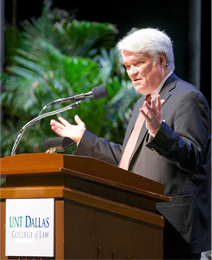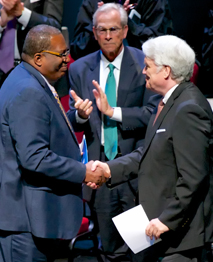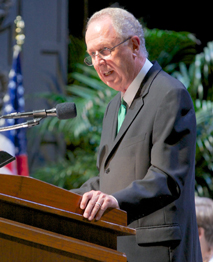© 2014 The Texas Lawbook.
By Natalie Posgate – (August 11) – Texas’ highest ranking judge and other legal leaders in the state told University of North Texas law students Sunday that they are already making an impact in Dallas as the new law school’s first class.

Photo courtesy of Scott Peek Photography
“All of you are making history not just in the law school, but with new ways in learning and practicing the law,” said Supreme Court of Texas Chief Justice Nathan Hecht, the keynote speaker at UNT Dallas College of Law’s convocation ceremony for its inaugural class.
UNT’s law school is the 10th in the state but the first public law school in Dallas, which Chief Justice Hecht and others emphasized was long overdue and fills a void that North Texas legal education had needed for a long time.
Before lawmakers created UNT’s law school in 2009, during the 81st Texas Legislative Session, Dallas was the largest major metropolitan area in the country that did not have a public law school. Now that it’s here, the school says it offers the Metroplex a quality alternative to private legal education that is out of reach to many because of steep tuition rates.
Net tuition for 2014 for full-time resident students at the new law school is $12,540 – significantly less than the cost of private law schools, which easily reaches six figures by the students’ third year.
Located in downtown Dallas, UNT’s law school officially opens this week to around 150 students. The average age is 33, with an age range of 20 to 67 years. Minorities make up about 40 percent of the student body.

“For some, a legal education wasn’t in financial reach until now,” Hecht said during the convocation. “Everything is here for you to reach your dreams… to make your dreams real.”
Hecht spoke of the significant legal needs in Texas and encouraged the students to use their law degrees to find ways to offer affordable legal services to the community.
He pointed out that there are nearly 6 million people in poverty in the state who qualify for free legal services. Poverty or not, two-thirds of Texans today try to represent themselves during legal proceedings in family court, he said.
Even those who make a good income, such as those who work at small businesses, feel that they can’t afford legal services, he said.
“Legal services must be affordable,” the chief justice said. “There are ways to provide more affordable legal services without depriving lawyers from reasonable compensation.”
While the legal job market is still tight and “gloom still hangs,” Hecht said the need for good lawyers will always be around.
“I doubt there were any days society has needed lawyers more than today,” he said.
Sunday’s ceremony was attended by nearly 700 people, including past and current judges, elected officials, lawyers and bar representatives who gave the new law school their praises.

Included among those were State Senator Royce West and State Representative Roberto Alonzo, who both played crucial roles in getting the creation of the law school authorized within the legislature.
Part of the process started with a task force that was created in South Dallas that looked at higher education in the city and interviewed several university systems to figure out which one would be the best fit for a new law school, West said.
“What you do here over three years will have an indelible impression,” he said.
City Council member Phillip Kingston agreed.
“You thought you were just going to law school, but you’re part of the history of Dallas,” Kingston, who is also an attorney, told the new students. “Dallas has been led since its inception by lawyers.”
Darrell Jordan, a previous State Bar of Texas president and prominent Dallas attorney, told the students they were in good hands with UNT Law’s faculty, led by former U.S. District Judge Royal Furgeson, now the dean of the new law school.

Photo courtesy of Scott Peek Photography
“I’ve known the members of the faculty for a long time, and folks, they’re top notch,” he said. “The fact that the dean himself will teach a course on professionalism speaks great lengths for the school.”
UNT System Chancellor Lee Jackson said the new law school will not seek national ratings, focusing rather on “professional service excellence.” When the admissions committee looked at each prospective student, he said it didn’t just take test scores into consideration, but also character.
“This law school has an opportunity to start fresh,” he said.
During closing remarks, Dean Furgeson said the “lawyers who graduate” from the new law school “will be dedicated” to their clients, the community and public service.
© 2014 The Texas Lawbook. Content of The Texas Lawbook is controlled and protected by specific licensing agreements with our subscribers and under federal copyright laws. Any distribution of this content without the consent of The Texas Lawbook is prohibited.
If you see any inaccuracy in any article in The Texas Lawbook, please contact us. Our goal is content that is 100% true and accurate. Thank you.
